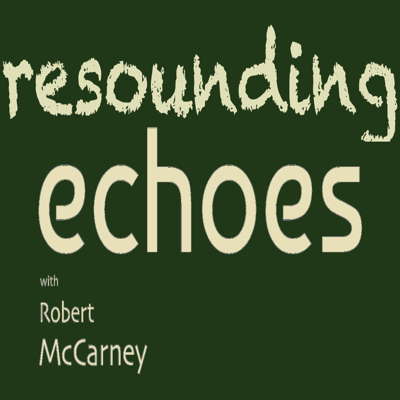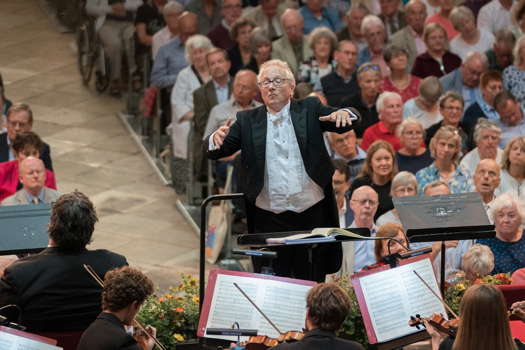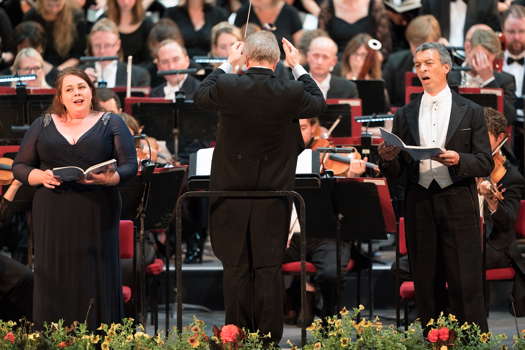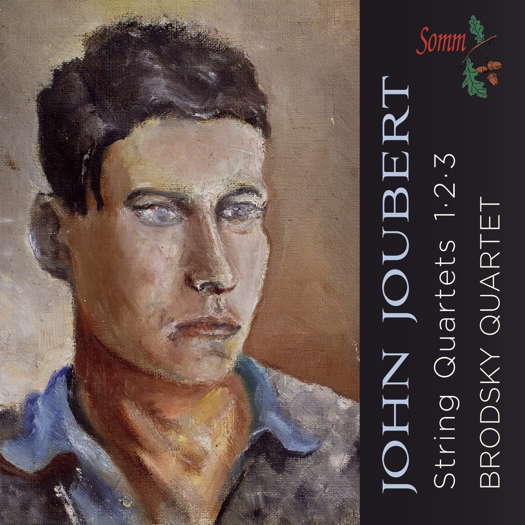 RESOUNDING ECHOES: Beginning in 2022, Robert McCarney's occasional series features little-known twentieth century classical composers.
RESOUNDING ECHOES: Beginning in 2022, Robert McCarney's occasional series features little-known twentieth century classical composers.
Packed With Good Things
RODERIC DUNNETT reports from the
2019 Three Choirs Festival in Gloucester
One ongoing sadness at this year's Festival was the continuing fond memory of Donald Hunt, formerly Music Director at Worcester Cathedral and of the Three Choirs when held at that city, and also a composer and author. (His biography of Samuel Sebastian Wesley - published by Seren Books - is excellently researched and presented.) He brought energy, good judgement and much personal character to each of the forces he presided over. Donald formed a long-term and very successful triumvirate with John Sanders at Gloucester and Roy Massey at Hereford. Their standards and dedication helped move the Festival on to the enviable position it holds now. Hunt himself was a chorister at Gloucester under Herbert Sumsion, and became Sumsion's virtual assistant. Many of his loyalties lay with Northern cities - Leeds, Halifax, Huddersfield. He was eighty-eight when he died, and the news was announced at the end of the 2018 Three Choirs.
Donald Hunt was remembered this year with his Responses, included in the broadcast Wednesday Evensong that also handsomely featured James MacMillan: so Hunt's offering was to the fore on the BBC. The evensongs included a large amount of music written for Gloucester Cathedral: Howells; David Bednall's Evening Service; a new set of Canticles from assistant organist Jonathan Hope, who also directs the Cathedral's Youth Choir (and this week the St Cecilia Singers), and who conducted this Evensong; and a set from Kerensa Briggs, who was a member of that same Gloucester Youth Choir, and now forging ahead as a recognised composer.
A newcomer to be congratulated was James Speakman, winner of the prize inaugurated in tribute to the late, much-loved Gloucester Cathedral organist John Sanders, who died unexpectedly during an operation in December 2003, aged seventy. Speakman set a Latin extract from Psalm 88, by means of an Introit, 'Tui sunt caeli, et tua sunt terra', this being the Vulgate Bible version. The work begins full-bloodedly, only to subside unexpectedly, with men's voices moving urgently beneath an atmospheric soprano line towards the close. A good choice.
The Sanders Society, set up by the Gloucester Three Choirs' Vice-Chairman, William Armiger, and which held a well attended lunchtime event, has proved a considerable success, gaining substantial support which has permitted it, so soon, to take welcome initiatives such as this. That John has been remembered in ways he would so have welcomed could have proved immensely satisfying to him: he would have been moved; thus, touchingly, his memory lives on.
Hereford's Geraint Bowen took the helm, not just for a finely calibrated reading of Handel's Israel in Egypt, but - notable or reprehensible - for Mendelssohn's (rarely heard) reworking of Handel's score: which many admired, but some pundits opined to be verging on blasphemous! Its first performance, in 1833, at the Lower Rhine Festival at Düsseldorf (coincidentally centred, too, on three cities - Aachen, Cologne and Düsseldorf) - at which Elgar's The Dream of Gerontius received its much-relished first German performance soon after its Birmingham fiasco, was followed by five more in Germany under Mendelssohn's lead.

Hereford's Geraint Bowen generates a stirring performance of Handel's Israel in Egypt, in the edition by Mendelssohn. Photo © 2019 Michael Whitefoot
In a way, the burgeoning stagings of Handel operas and interest in his oratorios have given choirs, when well conducted, a greater familiarity with, and attention to generating a more vivid stylistic approach to Handel's oratorios. Handel is also not, despite what one might think, a composer it is easy to conduct - just to lie back and beat the time. There are numerous subtleties, potential for dynamic shift, need for determined coaxing on, for finessed subsidence of movements, and, conversely, for absolutely perfect starts, that make demands on the conductor - here Bowen - if he is to maintain the drama and sometimes aggressive power where the biblical narrative fires up to moments of near-frenzy. All must be rigorously rehearsed, in a scarily short time. Even the Philharmonia itself needed astute and careful handling.
The Three Choirs Chorus, in this not surprisingly rather fierce work, came up to the mark, as it did all week. (It used to tire later on; no more of that now.) In the Mendelssohn version the outline is largely unaltered. Essentially the tenor Narrator (Stuart Jackson) keeps the story on the move: it is a new Pharaoh (possibly Rameses II, one of the most powerful of all Egyptian monarchs). Only later does the lead soprano soloist (Susanna Fairbairn) appear, generating variety and welcoming the finally attained freedom of the Israelites.
The parting of the Red Sea is - initially - handled almost peremptorily: 'He rebuked the Red Sea, and it was dried up ... But the waters overwhelmed their enemies: there was not one of them left.' But urged on by Bowen, the chorus - sometimes terrifyingly bombastic - continued gloating over the submerging of their captors and their watery victory. The actual plagues are shared around: the bass for frogs, the champing at the bit chorus for flies, lice and locusts, then hailstones and fire, darkness, and finally the first-born. The story is dramatic enough even when described; the impact of the largely violent interventions of Bowen's chorus was often intimidating. In such boastful sections, any extension or elaboration of the orchestral textures by Mendelssohn - enlarged woodwind and especially the quite forthright introduction of clarinets, while not necessarily heightening the tension, on occasion increased the exoticism, and sometimes the bald triumphalism, of different numbers.
Not least, for the preservation of balances, allowing the woodwind to peer through eloquently, and to produce quite distinct varieties in volume from, where appropriate, both upper and lower, or indeed massed, strings. Bowen's now long experience since succeeding Roy Massey at Hereford is evident more than ever: his performances are beautifully mapped out, reflecting a high degree of not just musical expertise but solid common sense. He is, one can see, a conductor who evidently knows where he wants to go, and has the gift of communicating that to all the forces he is faced with: no mean feat.
The rest of the work (though in fact based on Exodus) is cleverly designed like a huge unceasing glorying in the might of Yahweh. 'Die Himmel sind dein': The heavens are thine, the earth also is thine ...' (a heavenly alto-bass duet); and 'Thou didst blow with the wind, the sea covered them; they sank as lead in the mighty waters' ('... in dem mächtigen Wasser.') - the latter allotted to Rebecca Afonwy-Jones, the second of the two sopranos. One of the most exquisite moments, amid a host of finely manufactured, nigh-on ear-splitting choir sections, was the melting alto solo (by Jess Dandy, who has sung in Samson at that other spiritual home of Handel's, the Handel Festspiele in Halle, former East Germany), 'Bringe sie hinein und pflanze sie auf den Bergen', an entrancing moment of respite amid the general hubbub - and taken up by some vital tenors not dissimilar in spirit to the composer's Coronation Anthems. The fabulous ending, with soprano solo soaring over the chorus before the last explosive fugue, was as inspiring as anything.
With or without Mendelssohn, this whole Old Testament experience, with such patently well-rehearsed, fine quality singing and playing, was wholly uplifting.
Bowen's other success of the week, Sunday's Evensong apart, was a fantastic performance of Vaughan Williams's First Symphony, A Sea Symphony. Hearing at least the last part of the work had occurred at Gloucester in 1925, introduced by Herbert Brewer, and in 1936 again at Hereford. The clerics were not happy about the rest of the text. But 1962 at last saw a full performance of the symphony, which has since surfaced as something of a favourite some five or so times on the Three Choirs programme.
The text, which gave such initial clerical trouble, was four weighty sections by Walt Whitman (1819-92, whose bicentenary falls this year). Stanford, who had already set some Whitman, featured that evening in a rollicking delivery of his Songs of the Fleet, in which the baritone (here the indefatigable and demonstrative Roderick Williams) prefaces the choir in the second movement but follows them in section 3, 'The Middle Watch', vividly driven by Bowen and embellished by trumpets, piccolo and (especially) a lively tuba. Parts of the work are like a fast sea shanty, and 'The Little Admiral' starts with the baritone again in scherzo mood; parts dance, in a somewhat rum-ti-tum, even to today's ears comic, demeanour.

Soloists Katherine Broderick and Roderick Williams in Vaughan Williams' A Sea Symphony, with Geraint Bowen conducting. Photo © 2019 Michael Whitefoot
But Bowen's Sea Symphony was simply thrilling. The choir rose to the occasion, the massive opening, the choir's fugue 'Token of all brave captains', the baritone's brisk passage 'The Waves', taken up by the chorus, all helped by well-judged word repetitions, and the wonderful lento with which Bowen inspiredly teased out the beginning of part 4, introduced by a magical triplet ('swimming in space'), all contributed. 'Wandering, yearning' was here indeed searching and questing. The further repetitions of the sopranos ('with that sad incessant refrain') could not have been more apt; at 'After the seas are all crossed', as it speeds up, Bowen generated an urgent accelerando: the lines that did please the 1925 clerics invoke God: 'The true son of God' ... 'singing our song of God', by which time the soprano (Katherine Broderick) and bass launched into a heavenly canon, playing off one another. A violin solo from the Philharmonia's leader, the beautifully expressive Zsolt-Tihamér Visontay, and - not for the last time - solo oboe (Timothy Rundle) ushered in the most glorious of all moments, the soprano-baritone 'Bathe me O God in thee.'
Review continues on the next page >>
Copyright © 31 August 2019
Roderic Dunnett,
Coventry UK





